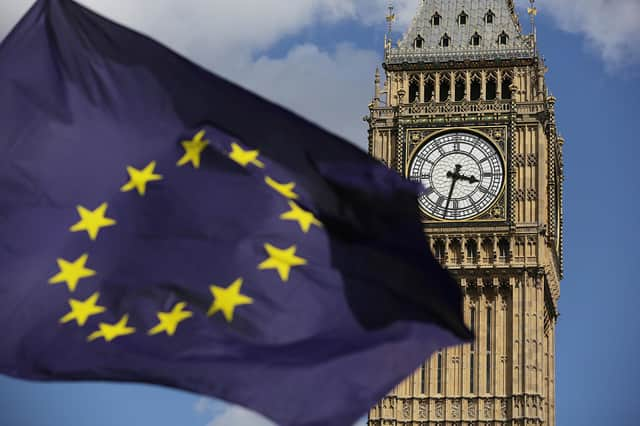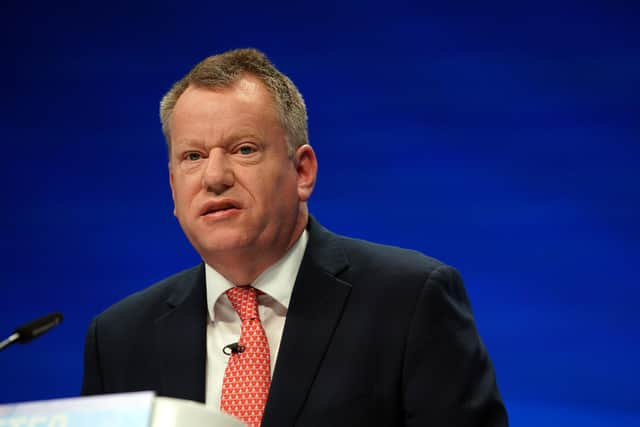Lord Frost: Here are some tests that should be met before backing the Northern Ireland Protocol deal


Lord Frost helped negotiate the Withdrawal Agreement including the Northern Ireland Protocol in 2019, and was later the then prime minister Boris Johnson’s Europe advisor until 2021. Over the course of that year he became increasingly critical of the protocol, and said that it had been negotiated at a time of “extreme weakness” for the UK government. He said a “crucial pass had been sold” by Theresa May’s earlier administration when it agreed to “maintain full alignment with those rules of the internal market and the customs union” which “support north south co-operation, the all island economy and the protection of the 1998 agreement”
I have not heard anything authoritative about the possible deal on the NI Protocol from anyone in the government.
Advertisement
Hide AdAdvertisement
Hide AdAnyone who does may find it useful to have the following questions / tests in mind as they assess what they are told.


The technicalities that follow are important. We have learned we can't rely on EU commitments that aren't tied down or rest on good faith or the EU's acting reasonably. They need to be legally clear and enforceable. If they aren't, we will be back here again before too long.
1. First, on goods movements from GB to NI. We are told (by some) that EU law has been "disapplied". That is a very sweeping and on the face of it surprising statement.
Quote Tweet
Harry Cole
@MrHarryCole
EXC: major sticking point for DUP is fact there will be continued ECJ oversight on goods produced in Northern Ireland shipped to GB. Sunak claims to have negotiated vast majority of checks on GB-NI with EU law disapplied. But DUP say not good enough.
Advertisement
Hide AdAdvertisement
Hide Adi What does this mean? Has EU law been removed in a legally binding way (so goods movements are now covered by UK law), or is it more nebulous ie a declaration, EU agreement not to enforce in certain circumstances, or similar? Do the Protocol or EU laws actually change?
ii Has EU law been "disapplied" for the purposes of checks only, or for *all* processes end to end, eg any trusted trader scheme, paperwork, etc? (It is of course the processes for GB firms that are a big part of the problem.)
iii Does it mean that all UK-standard goods are in future guaranteed exportable to NI for free circulation in NI, or does the checks / process suspension only apply if the goods meet EU standards?
2. On EU law and the democratic deficit, ie the imposition of goods single market, VAT, and state aid rules on NI without consent:
Advertisement
Hide AdAdvertisement
Hide Adi. Do all the existing and future EU laws remain in force in NI?
ii. Is EU law removed in any way?
iii. If NI institutions are given any involvement in rule-making, is it genuine (ability to block / change) or cosmetic (eg right to be consulted only)?
iv. Does the UK Government get the legally assured right to change VAT rates in NI or to set up freeports like those in GB?
3. Has the EU agreed any restrictions on use of infraction procedures, ending in the ECJ, either in a legally binding way or as a political commitment?
Advertisement
Hide AdAdvertisement
Hide Ad(NB it was immediate recourse to these procedures in March 2021 that helped precipitate the present crisis.)
4. Have any changes been made to the Article 18 consent mechanism under which Stormont has the right to scrap the Protocol in 2024, with the UK and EU replacing it with something else? Is the UK Government committed to support the Protocol remaining in force?
5. And finally, has the UK made any commitment to withdraw / freeze the Protocol Bill?
Do any provisions of the new deal change or collapse if the Protocol Bill remains in play or is ever brought forward again?
Advertisement
Hide AdAdvertisement
Hide AdI don't say *all* these tests must be satisfied for a deal to be worth considering. But if most aren't, or there is a lot of ambiguity on the crucial ones, the deal won't change much in real life, whatever the spin put on it.